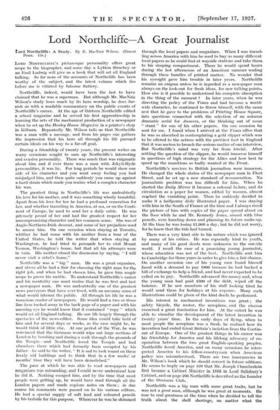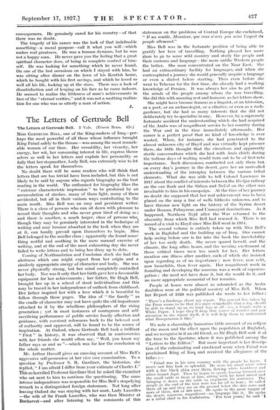Lord Northcliffe —A Great Journalist
LORD 'NORTHCLIFFE'S picturesque personality offers great scope to the biographer, and some day a Lytton Strachey or an Emil Ludwig will give us a book that will set all England talking. So far none of the accounts of Northcliffe has been worthy of the subject, and the latest volume which lies before me is vitiated by fulsome flattery.
Northcliffe, indeed, would have been the last to have claimed that he was a superman. But although Mr. MacNair Wilson's study loses much by its hero worship, he does fur- nish us with a readable commentary on the public events of Northeliffe's career. At the age of thirteen Northcliffe edited a school magazine and he served his first apprenticeship in learning the arts of the mechanical production of a newspaper when he set up the Henley House Magazine in a printer's shop in Kilburn. Repeatedly Mr. Wilson tells us that Northcliffe was a man with a message, and from his pages one gathers the impression that his hero all through his life pursued certain ideals on his way to a far-off goal.
During a friendship of twenty years, the present writer on many occasions sought to sum up Northcliffe's interesting and evasive personality. There was much that was enigmatic about him and if ever there was a man with Jekyll-Hyde personalities, it was he. For long periods he would show one side of his character and you went away feeling you had misjudged him, and then quite suddenly you came up against a hard strain which made you realize what a complex character his was.
The greatest thing in Northcliffe's life was undoubtedly his love for his mother, and it was something wholly beautiful. Apart from his love for her he had a profound veneration for her, and whether travelling in America, at sea, or on the Conti- nent of Europe, he used to send her a daily cable. He was intensely proud of her and had the greatest respect for her uncompromising character and her common sense. She was of Anglo-Northern-Irish descent, and some of her prejudices used to amuse him. On one occasion when staying at Toronto, whither he had come with his mother from a tour of the United States, he told the writer that when staying at Washington, he had tried to persuade her to visit Mount Vernon, Washington's home, but that all his attempts were in vain. His mother closed the discussion by saying, "I will never visit a rebel's home."
Northcliffe was a " big " man. He was a great organizer, and above all he had a flair for choosing the right man for the right job, and when he had chosen him, he gave him ample scope to prove his mettle. To understand Northcliffe's career and his mentality one must realise that he was first and last a newspaper man. He was undoubtedly one of the greatest news purveyors that have ever lived, with an uncanny sense of what would interest the public. All through his life he was a voracious reader of newspapers. He would find a two or three line item tucked away in the back page of a paper and with his unerring eye he would know that it contained " copy " which would set all England talking. He saw life largely through the spectacles of the news-editor. Some idea would take hold of him and for several days or weeks, as the case might be, he would think of little else. At one period of the War, he was convinced that the Germans would wipe out large sections of London by bombing and during a walk through the grounds of the Temple—and Northcliffe loved the Temple and had chambers there which had formerly been occupied by his father—he said to the writer, " It is sad to look round on these lovely old buildings and to think that in a few weeks' or months' time they will have been demolished."
The pace at which he was able to read newspapers and magazines was astounding, and I could never understand how he did it. Nothing escaped him, and by the time that most people were getting up, he would have read through all the London papers and made copious notes on them ; in due course his comments were passed on to his various editors. He had a special supply of soft lead and coloured pencils by his bedside for this purpose. Wherever he was he skimmed through the local papers and magazines. When I was travel- ling across America with him he used to buy as many different local papers as he could find at wayside stations and take them to his sleeping compartment. There he would spend hours during the hot afternoons of an American summer wading through these bundles of printed matter. No wonder that his eyesight gave him trouble in later years. Northcliffe remains an enigma unless he is regarded as a newspaper man always on the look-out for fresh ideas, for new talking points, How else is it possible to understand his complete absorption in the thing of the moment ? In later years, when he was directing the policy of the Times and had become a world- wide character, he continued to throw himself, with the same zest that he gave to the problems of Printing House Square, into questions connected with the selection of an autumn dramatic serial for Answers, or the thinking out of some "stunt" for one of his other papers. On one occasion he sent for me. I found when I arrived at the Times office that he was so absorbed in contemplating a gold slipper which was to be offered to the actress with the prettiest foot in England that it was useless to broach the serious matter of our interview. But Northcliffe's mind was very far from trivial. After settling the question of the slipper, he would immerse himself in questions of high strategy for the Allies and how best to speed up the munitions so badly wanted at the Front.
Northcliffe's services to British journalism were immense. He changed the whole status of the newspaper man in Fleet Street, and he set up a new standard of remuneration. No journalistic problem was too difficult for him. When he started the Daily Mirror it became a colossal failure, and its circulation as a paper for women, edited by women, almost reached the vanishing point. Then he suddenly decided to make it a halfpenny daily illustrated paper. I was staying with him in the South of France at the time and I always recall the picture of him with copies of the paper spread about on the floor while he and Mr. Kennedy Jones, armed with blue pencils, were kneeling down and planning its future make-up. At the time he was losing £1,000 a day, but he did not worry, for he knew that the tide had turned.
There was a very kind side to his nature which was ignored by many of his critics. He was especially kind to youth, and many of his good deeds were unknown to the outside world. I recall the case of a promising young journalist, whose education was not of the best. Northcliffe sent him to Cambridge for three years in order to give him a fair chance. On another occasion one of his young men found himself faced with a demand to pay £800 because he had backed a bill of exchange to help a friend, and had never expected to be called on to pay. Northcliffe advanced the money and, when the young man had paid 2300 of the debt, wiped off the balance. If he saw members of his staff looking tired he would send them for holidays at his expense. Many such illustrations could be given of the kind deeds he performed.
His interest in mechanical inventions was great;. the safety bicycle, the motor, the aeroplane, and the cinema exercised a great fascination for him. At the outset he was able to visualize the development of the latest invention in twenty years' time. In the early days of flying, when to most people the aeroplane was a freak, he realized how its invention had ended Great Britain's isolation from the Contin- ent of Europe. One of the greatest things in his career was his friendship for America and his lifelong advocacy of co- operation between the two great English-speaking peoples. Northcliffe loved America, and on many occasions he inter- preted America to his fellow-countrymen when American policy was misunderstood. There are two inaccuracies in Mr. Wilson's book which he should correct in future editions. He seems to imply on page 109 that Mr. Joseph Chamberlain first became a Cabinet Minister in 1895 in Lord Salisbury's Cabinet, and on page 260 Northcliffe is described as the founder of the Overseas Club.
Northcliffe was a big man with some great traits, but he was not a great man, although he was great at moments. He rose to real greatness at the time when he decided to tell the truth about the shell shortage, no matter what tha.
consequences. He genuinely cared for his country—of that there was no doubt.
The tragedy of his career was the lack of that indefinable something—a moral purpose—call it what you will—which makes real greatness. He was a human dynamo, but he was not a happy man. He never gave you the feeling that a great spiritual character does, of being in complete control of him- self. He was looking for something which he never found. On one of the last occasions on which I stayed with him, he was sitting after dinner on the lawn of his Kentish home, which he bought with his first savings, and which he loved so well all his life, looking up at the stars. There was a look of dissatisfaction and of longing on his face as he came indoors. He seemed to realize the littleness of man's achievements in face of the "eternal verities," and it was not a soothing realiza- tion for one who was so utterly a man of action.
J.















































 Previous page
Previous page